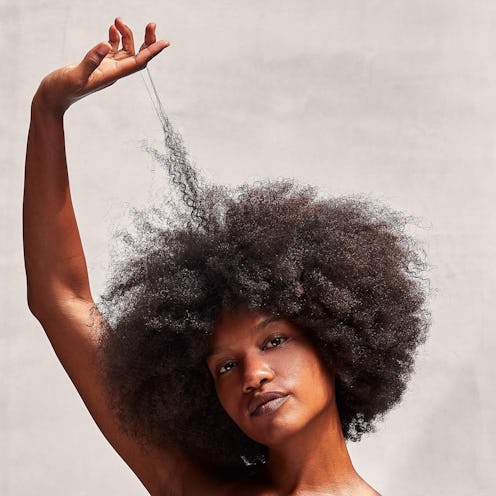(Hair)
Adjoa B. Asamoah On The Crown Act & The Politics Of Black Hair
A woman of many talents.

It’s not everyday you get to chat with someone who was the National Advisor for Black Engagement for the Biden-Harris Campaign, Social Impact Strategist for the CROWN act, and a faculty member for the Congressional Black Caucus Institute — among many other things. “I wear a number of hats, but all of those hats are consistent with whatever I think my people need me to do at a specific time,” Adjoa B. Asamoah, the 45-year old political and social impact strategist, tells me on a call from Washington DC, where she is working to teach the next generation of lawmakers through the Congressional Black Caucus Institute. “Every day I deal with this sort of outdated myth that you can’t be a master of multiple trades and it’s simply not true.”
Asamoah was born to a Ghanaian father — a retired Africana studies and political science professor — and an American mother — an organizer born in the Jim Crow South — and grew up in New Haven, Connecticut, with a deep interest in moving the needle for Black people. “I was at my first rally at the age of two, on my dad's shoulders, and would often spend time in his classroom learning first hand about the political systems of the world and how Black people are enslaved.” From a young age, she already knew she wanted a career dedicated to tackling anti-Blackness and advancing racial equity.
She began her career as a behavioral therapist and later pursued a master’s degree in educational psychology at Temple University. “I was working in juvenile justice and education and realized I wanted to tackle the issues in school settings,” she says. “I wanted to look at the ways school discipline is both racialized and gendered — I kept thinking, ‘Why are our kids suspended disproportionately for these sort of race-neutral grooming policies and standards?’” This research eventually led her to what is arguably one of the biggest moments of her career.
Asamoah spent the majority of 2019 and 2020 working with state and federal lawmakers to introduce the CROWN Act, an acronym for Create a Respectful and Open World for Natural Hair. The law explicitly bans race-based discrimination in relation to hair choices. It allows Black men and women and Black children to legally wear their twists, locks, braids, or teeny-weeny Afros proudly.
The fact of the matter is, hair decisions for Black people are inherently political. We decided to weave our hair and are accused of assimilating. We wear it natural or in braids and are praised for honoring our diaspora. The versatility of Black hair is great for the wearer but sadly open for public scrutiny and derision.
And as someone who helped develop the legislation for the CROWN act, Asamoah believes it represents, “a movement of choice including the choice and the right to straighten your hair if you choose without being on the receiving end of discrimination.” In other words, the CROWN Act was established to legitimize our experiences and our choice in deciding what hairstyle to wear. Her work helped galvanize New York and California to become the first states in 2019 to pass the CROWN Act, effectively banning hair discrimination. Since then, The U.S. House of Representatives past the act in September 2020 (as of August 2021, it is still awaiting a new vote in the Senate) and it has been introduced in more than 20 states since that date.
Fighting for the right to wear your hair however you choose is not just something Asamoah does professionally, but personally as well — by switching her hairstyle from blowouts, twists, braids, and afros. “The thing I’m out here working for is to preserve and protect our right to do what we want to do with our crown,” she says. “I think part of the beauty of Black hair is the versatility, and so I like to try different things with my hair, and I don’t believe I should be discriminated against that.”
The organizer sees her hairstylist every seven to ten days not only to maintain her curly hair, but also as an act of self-care. “I really encourage Black women to prioritize self care. We tend to think of self-care and self-prioritization as being something that is reserved for wealthy women, and it can’t be. It has to be central to movement work, not an afterthought. You need to make sure you are whole, restoring and filling yourself up so that you can give to the larger movement.”
Now, as part of the team that helped convince 87% of Black Americans to vote for President Joe Biden and Vice President Kamala Harris, Asamoah will continue to train the next generation of political operatives and candidates for the Congressional Black Caucus Institute, and of course, work to outlaw race-based hair discrimination nationwide. “In all my roles, my main goal is to advance racial equity and challenge anti-Blackness,” she says. “I view this as my assignment, my contribution to the movement. And really, my life’s work.”
This article was originally published on